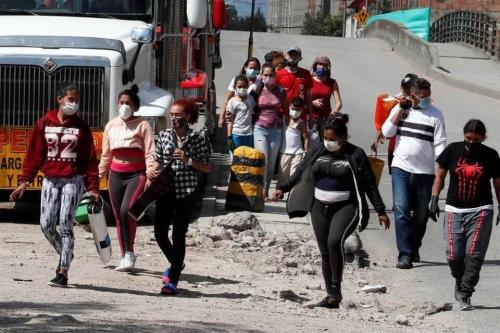Discrimination as a structural axis of migration policy
- Opinión

Since the beginning of the current United States (US) government, a discriminatory immigration policy has been accentuated, in opposition to the human rights of the various groups of migrants (especially those of a forced and undocumented nature). The measures in which these policies have materialized range from attempts to build the wall, mass raids and deportations, the separation of families and the detention of children, to the declaration and cancellation of the right of asylum, isolation and seclusion, the physical attacks and deaths of dozens of migrants. These already serious and frequent situations have worsened since the start of the pandemic in the United States, which has been used deliberately and politically to further promote a clearly anti-immigrant and discriminatory official nationalism agenda.
Particularly with regard to the right of asylum for forced migrants, there have been frequent and serious irregularities since before: recurrent failures of due process, notorious reductions in the number of cases / applications processed and approved, measures to force asylum seekers to stay in a neighboring country (Mexico) while carrying out the respective procedure.
Added to this adverse scenario was the proposal of June 10, 2020, for a new asylum rule, a measure promoted by the US Departments of Justice and Homeland Security that seeks to limit the interpretations of asylum causes, as well as reduce and limit the power of judges in asylum cases [1]. In fact, it is a profound and accurate blow to the model of the request for the right to asylum built for decades and aimed at monitoring the human rights of forced migrants who, because their lives and physical integrity were at risk, fled their countries of origin for five typified causes ("race", nationality, religion, posture / political situation and being a member of a specific social group).
This new rule proposal is based on the purpose of speeding up processes, facilitating faster deportations and making it more difficult for migrants to access the courts (trying to ensure that many of them do not even reach the courts) [2]. One of the fundamental components is to reduce the judges' decision-making capacity and discretion. These actions, according to various pro-migrant lawyers, will affect thousands of people who have pending procedures for the right to asylum.
Like other key axes of US political life, the pandemic has been used by the executive branch to reinforce a way of doing politics characterized by unidirectionality, lack of inclusion and the forced introduction of measures that, far from being negotiated with the legislative and judicial powers, are imposed without regard. The contingency situation by COVID 19 has created a scenario to generate exceptional conditions in particular areas of socioeconomic and political orders, and the current US government, particularly on the issue of migration, has managed to take advantage of it significantly. This proposal for a new asylum rule is not an isolated case. In this sense, in addition to the recent irregularities and attacks on migrants in US detention centers, there are also the dizzying deportations of thousands of migrants which, without following due process in the corresponding legal frameworks, have been happening for weeks [3].
However, there are also resistance actions that are being carried out by various sectors and social organizations. Particularly noteworthy are the pro-migrant groups and legal organizations that have not only been denouncing and registering these attacks on migrant communities but have also filed various legal remedies to counter these measures. For their part, migrant communities have tried to strengthen alliances with support groups and legal advice, as well as giving continued support for those of their members who are in more vulnerable and higher-risk situations.
From a historical perspective, it is known that many of these migrants who now request the right of asylum (for various causes of violence), come from countries such as those of the Northern Triangle of Central America (El Salvador, Guatemala, Honduras), where the historic United States intervention (economic, with the promotion of structural reforms, and political, with the destabilization of democratic regimes), over decades, has generated such adverse living conditions that it produces massive exoduses, such as those now appearing, of people who are only seeking to survive and to lead a dignified existence.
For Balderrama ... ... thinking that there will be a day where societies and countries recognize the value of human life for itself and as a fundamental axis of coexistence, regardless of the nationality and citizenship of people, nor their economic status and cultural ethnic context.
Notes
[3] https://www.alainet.org/es/articulo/206977
Del mismo autor
- Forced internal displacement in Mexico and processes of violence 13/03/2022
- Labor struggles against precarious work and agribusiness exploitation 09/01/2022
- Detentions, deportations, and criminalization of migrants 29/11/2021
- México: detenciones, deportaciones y criminalización de los migrantes 15/11/2021
- Visibility of migrant voices and subjects 18/10/2021
- La decolonialidad y el abordaje de las movilidades humanas transfronterizas 01/10/2021
- Migrants, social organizations, and policies to control cross-border mobility 20/09/2021
- Decoloniality and sense of the production of social knowledge 06/09/2021
- Decolonialidad y sentido de la producción de conocimiento social 26/08/2021
- México: migrantes, organizaciones sociales y políticas del control de las movilidades transfronterizas 09/08/2021
